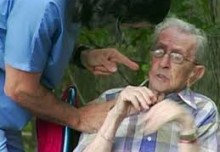 The Covid-19 pandemic and quarantine are receding in our collective rearview mirrors, but there are some lasting and devastating effects that remain…and they aren’t health-related. We have talked about how isolating the pandemic was, especially for older adults who may have been single during this quarantine. Beyond the unfortunate older adults whose communities may have been ravaged by the virus, the number of older adults who have been and may continue to be exploited financially has seen a sharp upturn.
The Covid-19 pandemic and quarantine are receding in our collective rearview mirrors, but there are some lasting and devastating effects that remain…and they aren’t health-related. We have talked about how isolating the pandemic was, especially for older adults who may have been single during this quarantine. Beyond the unfortunate older adults whose communities may have been ravaged by the virus, the number of older adults who have been and may continue to be exploited financially has seen a sharp upturn.
In a recent survey reported by The American Journal of Geriatric Psychiatry, the incidence of financial abuse among older adults has doubled during the pandemic. More than 21 percent of older adults reported some form of financial abuse or scamming during the quarantine which is double the one in ten rate of reported financial abuse in the period before the COVID-19 outbreak. What is all the more troubling is the fact that these are just the individuals who reported being scammed. Given that many financial abuse cases go unreported or unrecognized, we may now be in a continued pandemic of a financial sort among older Americans.
Many older adults are relatively easy prey to those who will exploit their social isolation and the prospect that no one is looking out for their well-being while we were all maintaining distance to avoid spreading the virus. It could be a long lost school classmate of mom or dad, or maybe another individual whose work brought them in contact with a lonely senior. If you have an older loved one with whom you are now reestablishing contact, it is important that you help with a financial security check up. If you are not a legal power of attorney, you will have to be delicate about questions, but you can still look for signs of abuse:
- Have their been any changes to estate planning documents?
- Any purchases that seem unusual by their dollar amount or nature?
- Has your loved one been making more trips to the ATM for withdrawals?
- Have any bills gone unpaid?
- Any new credit cards arriving in their mail?
- Has your loved one talked about time spent with a “new friend?”
- Are their any pieces or art or family heirlooms missing?
With all of these, it may not be a stranger who is perpetrating the fraud on your older loved one; it may be a niece, nephew, child or grandchild or neighbor. Be prepared for your loved one to be perhaps indignant if you suggest anything, and be prepared to reach out to a community department of Senior Services. You also can find an accredited Elder Law Attorney by way of their National Association. Elder abuse is an epidemic for which there is no vaccine. Local law enforcement departments also have community outreach offices to help.
Charlotte Bishop is a Caregiver Coach, an Aging Life Care Advisor, a Geriatric Care Manager and founder of Creative Care Management, certified professionals who are geriatric advocates, resources, counselors and friends to older adults and their families in metropolitan Chicago. She also is the co-author of How Do I Know You? A Caregiver’s Lifesaver for Dealing with Dementia.






